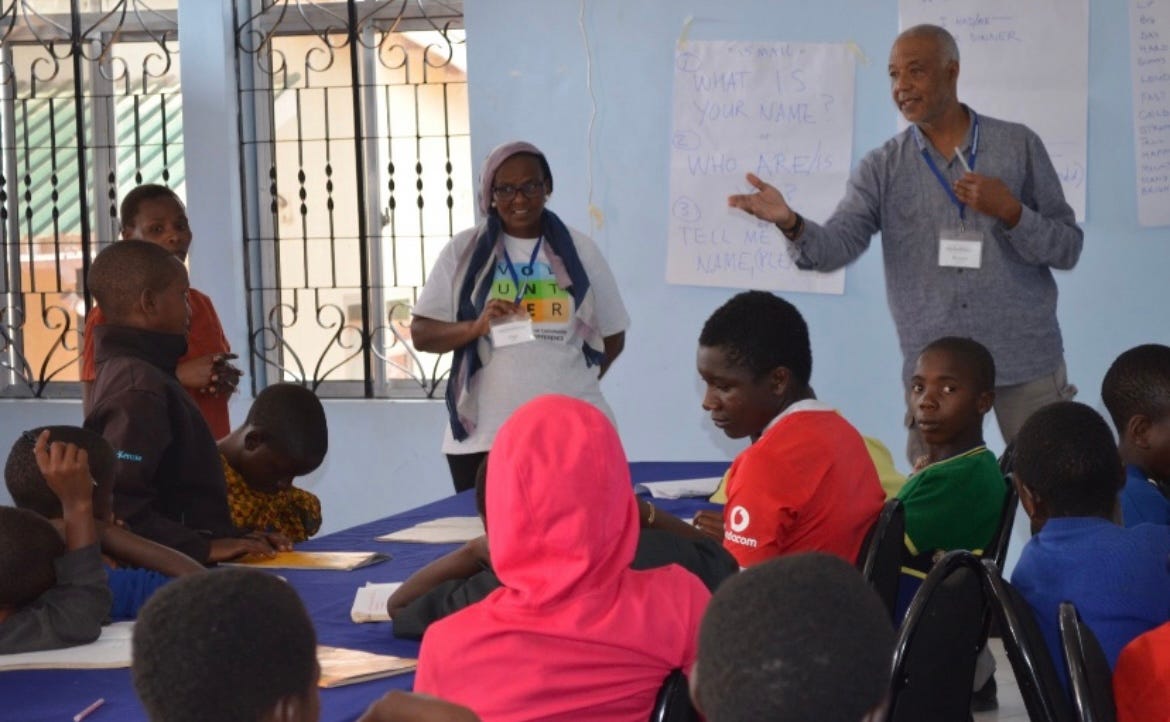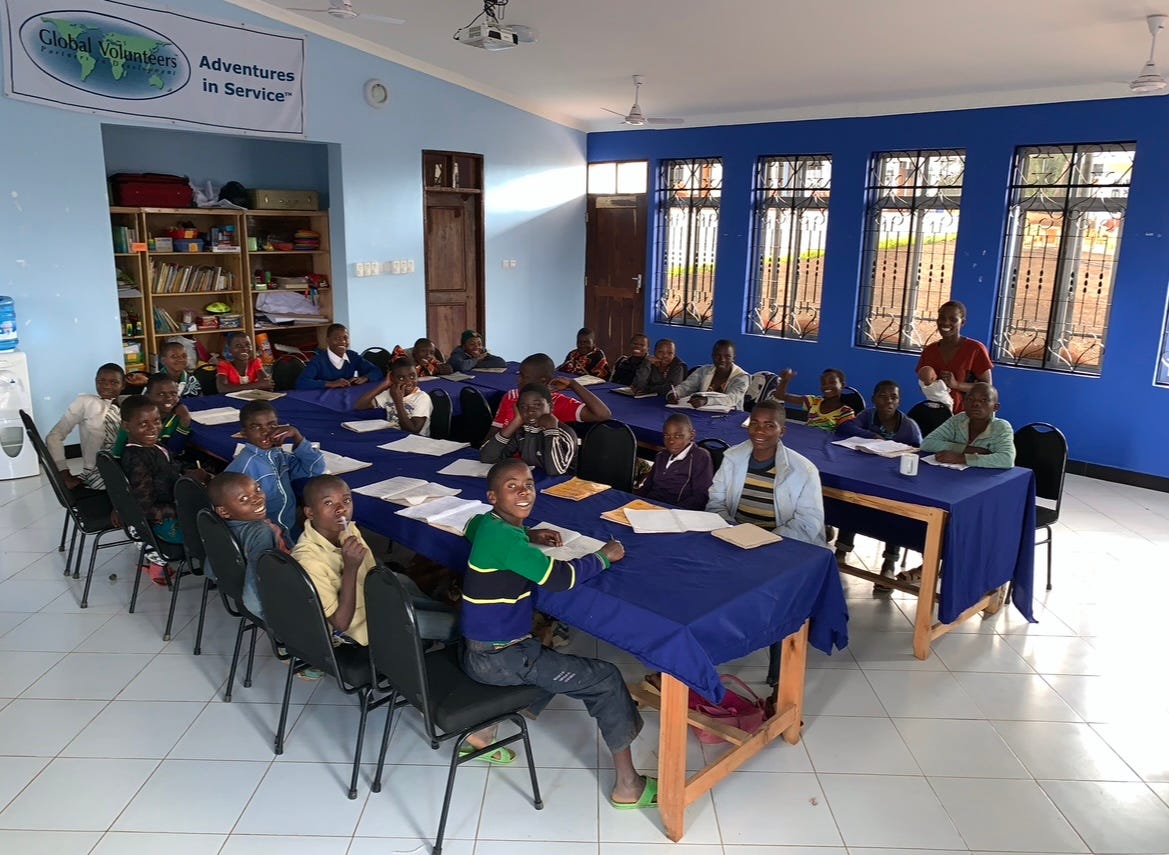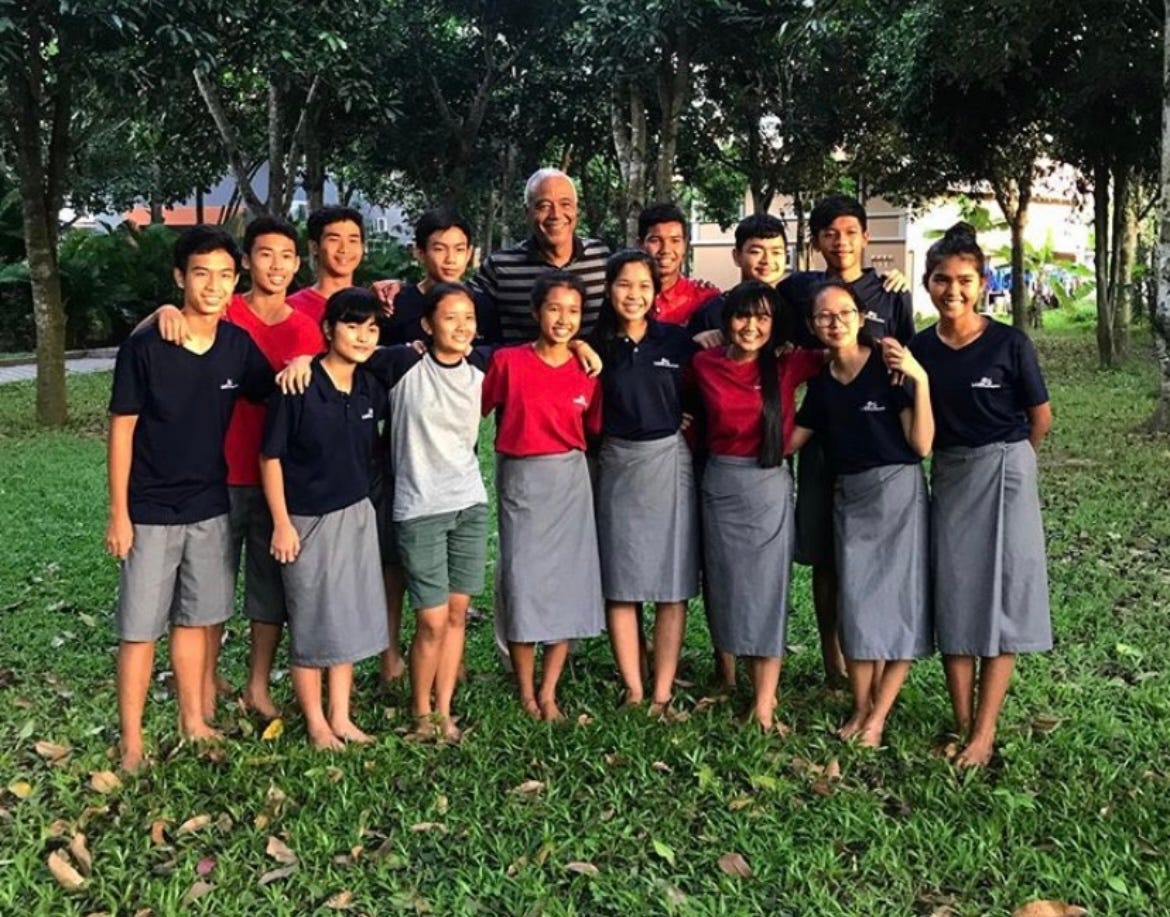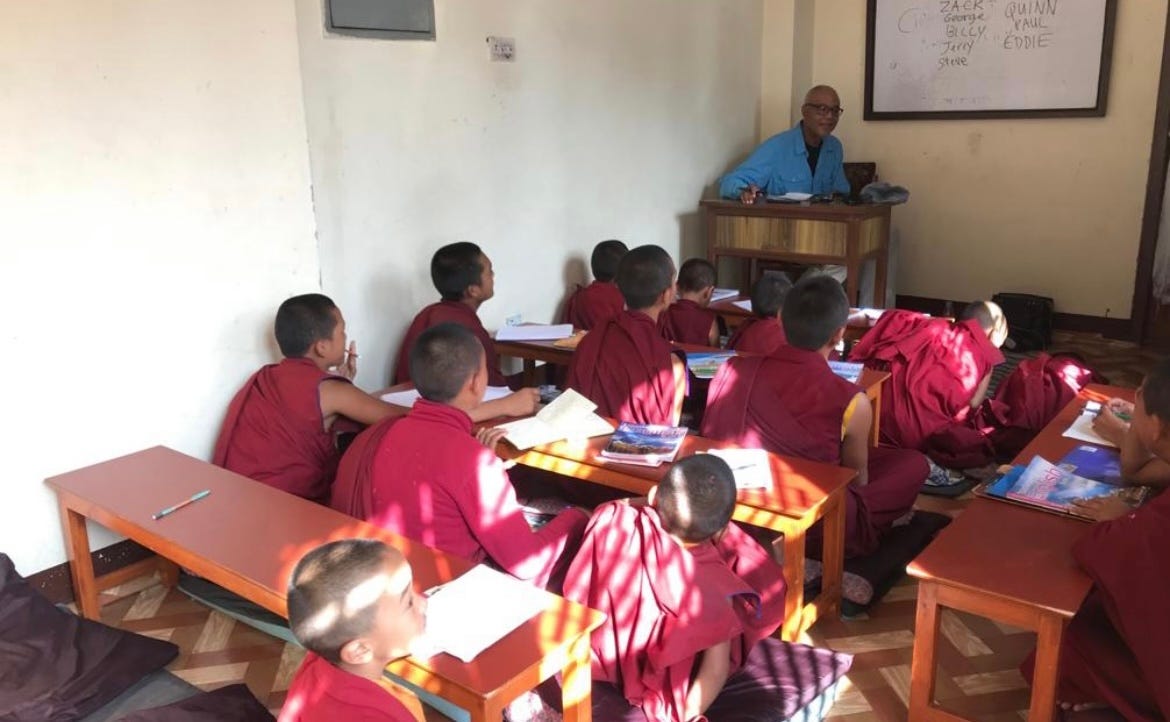I Retired 5 Years Ago. What A Long, Strange Trip It's Been.
I spent 40-plus years in news. Then I had to find a "Second Act."
Teaching English in Tanzania, 2018
I was originally going to post this on September 28th, the fifth anniversary of my last day at ABC News after 32 years. But then I decided that September 29th made more sense. September 28th was the end of something, an occasion for reflection. The 29th marks the beginning of something new. An occasion for celebration.
September 29, 2018 was a Saturday. That afternoon, I went back to ABC headquarters to finish the Herculean task of cleaning out my office. But I no longer had an employee magnetic card key. At the entrance, a security guard asked me who I was there to see. I took offense, even though he was right. I pointed to a promotional poster on the wall a few feet away which featured the weekend Good Morning America team, including me.
"That's me," I said pointing to the poster. As if that somehow entitled me permission to enter. I was not being rational.
GMA Weekend team, with Rob Marciano and Sara Haines (back row), Paula Faris and Dan Harris (front)
The security guy was unmoved. While we were talking, Charlie, one of the Props guys from the weekend show, had entered and was watching with amusement at this exchange. He told the guard I could come in with him as his guest.
The summer before my retirement had been tumultuous. In July, I contracted Lyme’s disease and besides the signature debilitating fatigue, I had the unusual additional symptom of double vision, which scared the hell out of me and kept me out of work for two weeks. I hadn’t missed two weeks cumulatively in my entire time at ABC News. Then, at the beginning of August, my older brother Keith died suddenly and unexpectedly in Los Angeles. A friend also died that summer. By the time things had settled down, it was September and the end was fast approaching.
I had given a lot of thought to what I would do in retirement. I was fortunate that I could afford to retire — one of the great American tragedies is how, in the richest nation in the world, many people cannot. They have to keep working or move in with relatives or, worst case, slip into, or deeper into poverty and even homelessness. My chief concern was merely what to do with my life. I'd been working without a break since I was 23. My career as a journalist had been intense, all-in, often frenetic. I loved it. The “juice” of chasing a story, traveling the country and the world, witnessing history in real time. What would replace that thrill?
I had a plan. I knew I wanted to travel. Not just to see the sights but to travel and do something. I had spent my career observing. I wanted to be engaged in the world. I would go around the world, stopping first in Tanzania with a group called Global Volunteers and teach English to children and help install hand washing devices in a tiny remote village called Ipalamwa.
I liked the hard physical labor of installing the handwashing stations. I loved teaching. I loved the energy and enthusiasm of the children - they were teens. I loved the sound of their laughter. I loved seeing the small steps of progress they made in the two weeks I was there. In Tanzania, as in much of the underdeveloped world, a functional knowledge of English provides an opportunity to work in the tourism business and many other fields.
English class in Ipalamwa, Tanzania. I was there with Global Volunteers
There was a little guy in the class of around two dozen who had started out sitting in the back and never speaking up. He was shy and quiet. By the second week, he was sitting up front, raising his hand to answer questions, practically leaping out of his seat to be called on.
At the final class, I said goodbye to the kids. I told them I believed in them. I told them to keep going, that they could be anything they wanted to be, but to do so, they had to get an education.
A boy raised his hand to speak. I thought he would say something about the class, maybe I was hoping he'd say something about me.
"When does the next teacher arrive?' he asked.
I was taken aback. I even felt a little hurt. What about me? Then, in an instant, I realized that that was the best thing he could have said. He was not looking back. He was looking ahead. He wanted to keep going. That's exactly what a teacher should want from a student - a desire, a hunger to learn more. And that experience made me want to teach again.
Over the next five years, I would have many teaching opportunities.
With students at Liger Academy, Phnom Penh, Cambodia
The next summer, I worked with Cambodian high school seniors at a fantastic school in Phnom Penh called Liger Academy. I helped the students, many of whom did not speak English fluently, with their college application essays.
That fall, I went to Nepal to teach English to young monks - some as young as 4 - at a monastery just outside the capital city of Kathmandu. Each morning I would take a local bus, which amused the local people on the bus, to the end of the line and then hike up a hillside in the dirt or muddy streets to the monastery.
At lunch one day, I was talking to the head monk, a native of Tibet, a man of around 50 with a tranquil mien and beatific smile.
I told him about my path from television reporter to volunteer at the monastery.
He nodded his head slowly and then said to me, "You used to be a journalist. Now you are a teacher."
That was it. Succinctly. Precisely.
Teaching young monks in Kathmandu, Nepal
In the following years, I would take on new teaching projects, some as a volunteer, some for pay. I taught - and still do - English to new immigrants. I worked with high school seniors on their college application essays, which often required being not only a writing coach but also confessor and counselor. I picked up per diem work as a substitute teacher in Norwalk, Connecticut (I now know personally about the trials and tribulations of subs. The kids can practically smell our inexperience and know how to exploit it.)
For nearly three years, through a wonderful community service program in East Harlem called Little Sisters of the Assumption, I tutored a little boy from Guatemala. I'll call him Enrique. When I first met him, he had arrived in the U.S. with his family only a few months earlier. He spoke almost no English. At the end of each weekly session, Enrique, as he slung his backpack over his shoulders, he would turn to me and say, "Thank you."
Later, I would get the opportunity to co-teach a broadcast journalism course at the Columbia University Graduate School of Journalism. There was certain symmetry to that. I had gone there many years before, arriving knowing practically nothing. Now here I was in the role of instructor. I'm still doing that each spring term.
Just the other day, I got an email from one of my former students who'd just landed an exciting new position with an esteemed news organization. I hadn't heard from her since she graduated.
She wrote, "I'm forever grateful for the wisdom and support you've given, especially the way you believed in me and everyone in class."
The joy and fun and freedom of these past five years has been tempered by the loss of some of the most important people in my life. My mother died in 2019. One of my oldest friends died of Covid in 2020. Another close childhood friend - an extraordinarily good guy - died in early 2022. Another friend died just a month ago. And many others in my life have been stricken with serious illnesses. So far, I've been spared. Each one of them is a constant reminder to me of the fragility and impermanence of life, and also the importance of filling whatever time we have left with the things and experiences and people that give us meaning and pleasure. When we’re engrossed in our work lives - our careers - we are often running so fast and are so focused on that, it distracts us from the big question. What do we really want to do? How do we even know what that is?
Some years ago, I was doing a story about a corporate whistleblower in the Philadelphia area whose bravery and honesty exposed a scandal at her company. She had been fired, of course, but eventually found a new job at which she was happy and felt fulfilled. It had taken a while, but she was okay. I said something about how difficult it must have been to lose that security and plunge headlong into an uncertain future.
She smiled and told me a friend had counseled her before she blew the whistle: "She said, 'leap and a net will appear.'"
One reason I call this newsletter Second Acts is because it is part of my second act (or maybe my third). It’s my retort to the remark made by the writer F. Scott Fitzgerald who said, "There are no second acts in American lives."
Yes, there are.









Ron: Thanks for sharing your retirement experience. I enjoyed our time at the Daily News so many years ago. Be well. I also teach high schoolers interested in journalism as part of a nearby university program. They keep me young.
Ron: It's so wonderful to read what you've been up to in the years since we last saw each other. What a meaningful way to contribute to the world that you covered for so long. Well done, friend. - Pam Ferdinand